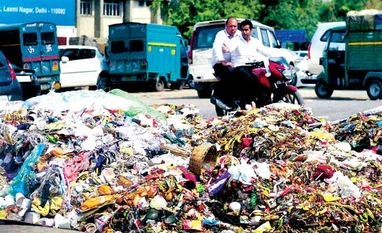The survey, commissioned by the Urban Development Ministry, is the first such since Prime Minister Narendra Modi launched Swachh Bharat Mission in October last year and aligns with the objectives of the Mission.
Apart from New Delhi and state capitals, Ahmedabad, Varanasi, Pune, Visakhapatnam, Gurgaon, Kochi, Nagpur, Amritsar, Allahabad are among the 75 cities, which account for over 50 per cent of country's total urban population, to be rated for its cleanliness.
More From This Section
The survey parameters have been aligned with the objectives of Swachh Bharat Mission with more focus on solid waste management which is adversely impacting cleanliness in urban areas, as per the directions of Urban Development Minister M Venkaiah Naidu.
The proposed survey and subsequent ratings, to be completed in January next year, is aimed at fostering a spirit of competition among the cities to ensure sanitation in urban areas, said a senior UD Ministry official.
In the proposed survey, solid waste management is being given 60 per cent weightage followed by 15 per cent each for availability and use of individual household toilets and public and community toilets besides 5 per cent each for city level sanitation plans and Information, Education and Behaviour Change Communication (IEBC) activities.
Under Swachh Bharat Mission, about Rs 37,000 crore of the project cost of Rs 62,009 cr is to be incurred on solid waste management.
In the last survey, for ranking 476 cities with a population of over one lakh each which was commissioned before the launch of Swachh Bharat Mission, solid waste management had a weightage of only 13 per cent.
Swachh Bharat Mission is aimed at ensuring door-to-door collection, transportation and scientific disposal of solid waste in all the 83,000 wards in urban areas by 2019 besides construction of one crore individual household toilets and over five lakh public and community toilets.
all the 75 selected cities were yesterday briefed in detail by Pravin Prakash, Joint Secretary and Mission Director of Swachh Bharat Mission about the objectives and evaluation parameters of the sanitation survey.
Survey agencies will collect necessary data from urban local bodies besides through direct observation and citizen feedback through questionnaires. A minimum of 15 respondents have to be reached out in each ward for feedback.
Under contractual obligation, survey agencies will have to furnish detailed documentation including photographs and video-clips of various places surveyed.
An illustrative account of evaluation parameters include formulation and making public city level sanitation plans and technology based systems for citizen complaints about sanitation and their redressal feedback.
In respect of solid waste management, the parameters include percentage of solid waste collected every day, its transportation, processing, recycling and re-use including conversion to compost and energy, scientific land filling, segregation of solid waste, availability of dustbins for general waste, collection and disposal of construction and destruction (C&D) waste, availability of debris on call service for C&D waste, levy of user charges, visibility of solid waste in open and public spaces etc.
With respect to individual and public and community toilets, the parameters include gaps in demand and supply, gaps in mission targets and actual physical progress, extent of release of funds under Swachh Bharat Mission and utilisation, waiting time for use of public toilets, availability of drainage system, notification of spot fines for open defecation/urination/littering, etc.
Under IEBC, activities of Swachh Bharat Ambassadors, putting up of large hoardings, use of local cable network and bulk SMS, social media interventions, organising awareness generation campaigns, etc will be assessed. Among the cities to be surveyed are Visakhapatnam and
Vijayawada from Andhra Pradesh, Guwahati from Assam, Raipur and Durg from Chhattisgarh, Itanagar from Arunachal Pradesh, Ahmedabad, Gandhinagar, Vadodara, Rajkot and Surat from Gujarat, Panaji from Goa, Gurgaon and Faridabad from Haryana, Shimla from Himachal Pradesh, Srinagar from Jammu & Kashmir, Ranchi, Jamshedpur and Dhanbad from Jharkhand, Bengaluru, Mysore and Hubli-Dharwad city from Karnataka, Kochi, Kozhikode and Thiruvananthapuram from Kerala, Bhopal, Indore, Gwalior and Jabalpur from Madhya Pradesh.
Ten cities from Maharashtra include Navi Mumbai, Greater Mumbai, Kalyan-Dombivali, Pune, Pimpri-Chindwad, Nashik, Aurangabad, Nagpur, Thane and Vasai-Virar.
Other cities include Imphal from Manipur, Shillong from Meghalaya, Aizawl from Mizoram, Kohima from Nagaland, Bhubaneswar and Cuttack from Odisha, Amritsar and Ludhiana from Punjab, Jaipur, Jodhpur and Kota from Rajasthan, Gangtok from Sikkim, Chennai, Coimbatore, Madurai and Tiruchirapalli from Tamil Nadu, Hyderabad and Warangal from Telangana.
Eight cities from Uttar Pradesh include Lucknow, Kanpur, Varanasi, Allahabad, Meerut, Ghaziabad, Noida and Agra.
Dehradun from Uttarakhand, Kolkata and Asansol-Durgapur from West Bengal are other cities in the list of 75 finalised by the ministry for sanitation survey.
)